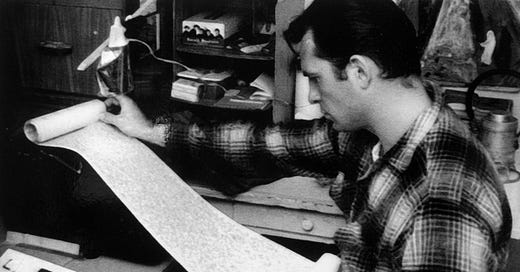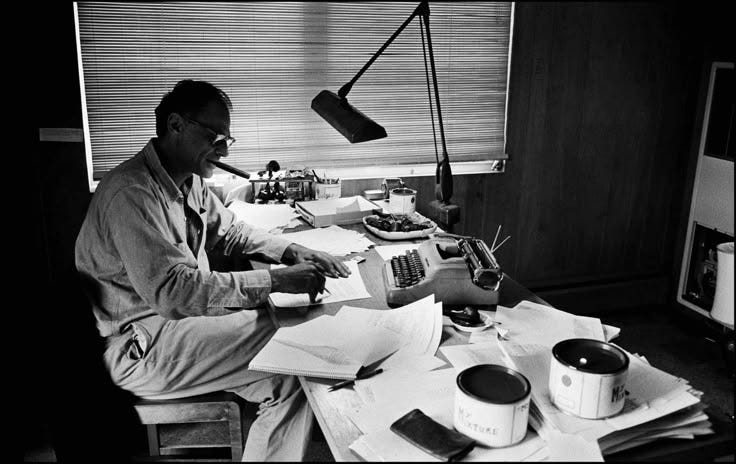We are born screaming into a world that quickly teaches us to smile.
By the age of five, we’re expected to suppress our terror and call it curiosity. By eighteen, we’re supposed to have a plan. By thirty, a mortgage. By forty, if we’re lucky, the hollow realization that the plan was never ours to begin with.
This is the tragedy of the modern man—not that he is lost, but that he is praised for pretending he’s not.
He scrolls through advice columns and dopamine-hacked timelines. He deadlifts and meditates, journals and time-blocks. He listens to Alan Watts at night and Andrew Huberman in the morning. Still, the itch remains. The quiet dread that none of it is real. That this whole thing might be a dream, and worse, a dream someone else designed.
Fyodor Dostoevsky understood this man. Not in the language of hashtags and hustle, but in the sickly groan of Raskolnikov, of Ivan Karamazov, of the Underground Man who declared, “I am a sick man… I am a spiteful man.” He was not being dramatic. He was being honest. The great Russian novelist peeled back the polite layers of culture and asked: what if the soul is not a social construct, but a battlefield?
In Notes from Underground, Dostoevsky introduces a man who rejects everything—reason, utopia, mathematics, science—because he senses they are too clean. Too convenient. Too lifeless. “Twice two makes four is not life,” he writes. “It is the beginning of death.”
This is where Friedrich Nietzsche steps in, uninvited and necessary. The mustachioed prophet of contradiction. His diagnosis: God is dead. His prescription: Become one.
For Nietzsche, meaning is not given—it is seized. Forged. Fought for. The man who waits for the world to tell him who he is will die a stranger to himself. “What does your conscience say?” he asks in Thus Spoke Zarathustra. “You shall become the person you are.”
But what if you don’t know who that is?
What if you suspect, as Alan Watts did, that there is no fixed “you” at all? That the ego is a clever illusion, a linguistic trick the universe plays on itself to experience separation?
“You are not a drop in the ocean,” Watts mused. “You are the entire ocean in a drop.” To him, the cosmos was not a machine to master but a symphony to rejoin. The tragedy of Western man, Watts argued, was his alienation—not from society, but from the dance. From the great, pulsing, interdependent miracle of being.
The Architecture of Emptiness
So where does this leave us?
In a paradox.
We live in an age that has everything—except the one thing it cannot manufacture: meaning.
We’ve conquered nature, digitized desire, turned attention into a currency. But in the quiet hours—after the emails, after the wine, after the children are asleep—we feel it. The ache. The suspicion that we’ve built an empire on sand.
Nietzsche warned us: when we kill God, we do not become free—we become weightless. Unmoored. Lost in what he called “the wasteland of nihilism.”
And yet, he did not mourn. He saw it as an opportunity: the great reckoning from which the Übermensch, the overman, might rise—not as tyrant, but as creator.
Dostoevsky was less optimistic. In The Brothers Karamazov, Ivan famously claims, “If God is dead, then everything is permitted.” This is not celebration—it’s despair. The idea that without a divine standard, morality itself collapses into appetite and chaos. He foresaw what Nietzsche danced around: that freedom, without love, becomes a curse.
So here we are. Between Dostoevsky’s God-haunted suffering and Nietzsche’s Godless liberty.
Alan Watts would chuckle at this standoff. “The clash between science and religion,” he said, “is like a debate over whether the sun is a round object or a hot one.” In other words, we are arguing inside a dream, forgetting that the dream is ours.
Becoming Real
If there is a middle path—between the guilt of religion and the abyss of nihilism—it is the path of awareness.
Not belief. Not ideology. But presence. A raw, vibrating attentiveness to what is.
To walk this path is to abandon certainty. It is to let go of the polished mask, the curated identity, the algorithmic comfort of being told what to want. It is to stand naked before the mystery and say: I do not know. But I am here.
This is what the mystics knew. What the madmen glimpsed. What every true artist, lover, and wanderer has felt—that beyond all labels and logic, life is. And that’s enough.
But don’t mistake this for resignation. It is not passivity. It is not nihilism. It is participation without illusion.
You don’t need a grand theory. You need a grounded soul.
A Manual for the Middle Path
This is not a doctrine. There are no ten commandments, no morning routine checklist. But there are signs. Clues. Things that seem to help when you’re wandering through the fog.
1. Embrace the Fall
You are not here to float. You are here to fall, beautifully, again and again—into grief, into love, into confusion. The fall is not failure. It is flight in slow motion.
2. Resist Resolution
Every system that offers to explain everything is lying. Life is not a riddle to be solved, but a relationship to be lived.
3. Make Art or Die
You must create. Not for followers or income, but because something in you will rot if you don’t. Sing badly. Write anonymously. Draw like a child. The point is not expression. It is exorcism.
4. Return to the Body
Your mind is a crowded train station. Your body is the quiet field beyond it. Walk. Breathe. Sweat. Dance. Touch a tree. Come home.
5. Pray Without a Name
Forget the gods you don’t believe in. Speak to the silence anyway. Light a candle. Kneel. Not for someone else—but because something in you longs to kneel.
6. Let the Questions Stay Open
What happens after death? Why do we suffer? What is love? Do not rush to answer. Let the questions become your companions. They are more faithful than any conclusion.
The Solitary Man
He walks alone.
Not because he hates others—but because he refuses to lie.
He walks through cities and forests, through heartbreak and absurdity. He is not heroic. He is not successful in the way the world measures it. But he is free in a deeper sense—free from the tyranny of appearances. Free from the cult of convenience. Free to look madness in the eye and say, “I see you. And I will walk on anyway.”
He does not need to be understood. That was the old hunger. He only needs to burn. Quietly. Consistently. Like a lantern in a cave.
He will meet others on the path. Sometimes. Briefly. A glance. A conversation that feels like déjà vu. But even then, he will walk on. Because the point was never to arrive. The point was to become.
Closing the Circle
And so we circle back.
Dostoevsky reminds us that suffering is sacred. That the cracks are where the soul gets in.
Nietzsche dares us to dance on the grave of certainty. To laugh like gods. To bleed like artists.
Watts invites us to let go. To float. To remember that the whole thing was never ours to control. Only to witness.
The man who walks alone carries all three within him—the prophet, the rebel, the monk.
He is not looking for answers.
He is becoming the question.
And somewhere, deep in the marrow of this strange, unrepeatable life, he suspects: that is more than enough.








“Because the point was never to arrive. The point was to become.”
If you become that means you’ve arrived somewhere. So it cannot be to become something
The point was to be.
Just be.
Be it anything or nothing but still it’s everything.
Just as you mentioned:
You are the entire ocean in a drop
This is what I am to substack for. Thank you